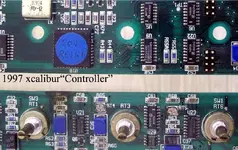rons1947
Full Member
- Jul 12, 2007
- 197
- 317
- 🏆 Honorable Mentions:
- 1
- Detector(s) used
- Garrett Ace 250,Minelab Excalibur 2,Tesoro Sand Shark
- Primary Interest:
- Beach & Shallow Water Hunting
Hi All.I sent my Excalibur 2 in for repair this Summer and they replaced the coil.I hadn't kept the sand from between the coil and coil cover,often enough,so the coil developed leaks and had to be replaced.The repair cost $297.00 . After I got the detector back,I put a spray-on coating on the coil to protect it from wear.It worked well for a while,then the detector started falsing in the water and wet sand.Sometimes,it falses at the extreme end of each swing,both left and right.I hunt Cocoa Beach mostly and we have had a lot of erosion and sanding in.I don't know if it's the detector or the beach conditions? Has anyone else had any falsing problems hunting this beach with the Excalibur 2? Thanks in advance.
Amazon Forum Fav 👍
Upvote
0











